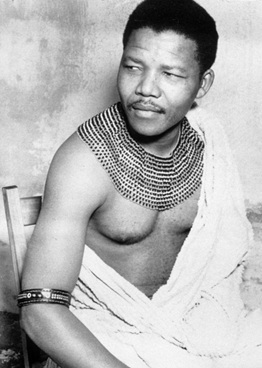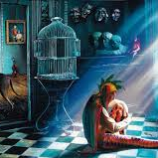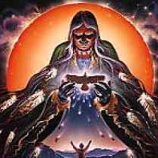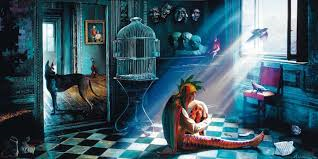Ancient man knew, in the most direct fashion, what to do and how best to do it. But, because he performed so well, he started to develop a sense of selfness, which gave him the feeling that he could predict and plan the actions he was used to performing. And thus the idea of an individual “self” appeared; an individual self which began to dictate the nature and scope of man’s actions.
As the feeling of the individual self became stronger, man lost his natural connection to silent knowledge. Modern man, being heir to that development, therefore finds himself so hopelessly removed from the source of everything that all he can do is express his despair in violent and cynical acts of self-destruction.
The reason for man’s cynicism and despair is the bit of silent knowledge left in him, which does two things: one, it gives man an inkling of his ancient connection to the source of everything; and two, it makes man feel that without this connection, he has no hope of peace, of satisfaction, of attainment.
The sorcerers discovered that any movement of the assemblage point means a movement away from the excessive concern with the individual self that is the mark of the modern man. They believe it is the position of the assemblage point which makes modern man a homicidal ego maniac, a being totally involved with his self-image. Having lost all hope of ever returning to the source of everything, man seeks solace in feeling himself. And, in doing so, ends up fixing his assemblage point at the exact position required to perpetuate his self-image.
Therefore, it is safe to say that any movement of the assemblage point out of its customary position results in a movement away from the self-reflection of man and his concomitant self-importance.
Sorcerers are absolutely convinced that by moving our assemblage points away from their customary position we achieve a state of being which could only be called ruthlessness. Sorcerers know, by means of their practical actions, that as soon as their assemblage points move, their self-importance crumbles. Without the customary position of their assemblage points, their self-image can no longer be sustained. And without the heavy focus on that self-image, they lose their self-compassion, and with it their self-importance. Sorcerers are right, therefore, in saying that self-importance is merely self-pity in disguise.
The position of self-reflection forces the assemblage point to assemble a world of sham compassion, but of very real cruelty and self-centeredness. In that world the only real feelings are those convenient for the one who feelings them.
For a sorcerer, ruthlessness is not cruelty. Ruthlessness is the opposite of self-pity or self-importance. Ruthlessness is sobriety. The ruthlessness of a sorcerer has many aspects. It’s like a tool that adapts to many uses. Ruthlessness is a state of being. It is a level of intent that the sorcerer reaches. Sorcerers use it to attract the movement of his own assemblage point or that of their apprentices. Or they use it to stalk.
Related Articles













